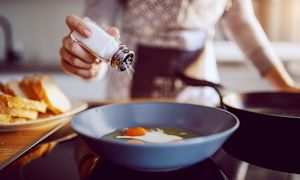A pumpkin's orange pulp is a great source of vitamin A, fiber and potassium.
Roasted, baked or steamed pumpkin can be used in soups, dips, pies or other baked goods. Pumpkin seeds also make a great snack. They are high in iron and unsaturated fats. These unsaturated fats may help to lower cholesterol levels when they replace saturated fats and trans-fat in the diet.
The best pumpkin for cooking is a "sugar pie pumpkin" or "sweet pumpkin." Their flesh is sweeter and less watery than the flesh of larger pumpkins.
Pick a pumpkin with 1 to 2 inches of stem left. If the stem is cut down too low, the pumpkin will decay quickly. Each pound of raw, untrimmed pumpkin will result in about a cup pumpkin puree.
Following are tips for preparing and cooking pumpkins:
- Cut your pumpkin in half, remove the stem, scoop out the seeds and scrape away all of the stringy mass.
- Cut the pumpkin into large chunks and rinse the chunks in cold water. Place the chunks in a large pot with about a cup of water (the water does not need to cover the pumpkin pieces).
- Cover the pot and boil for 20 to 30 minutes until the pumpkin is tender. Check for doneness by poking with a fork. The pumpkin should slide right off the fork prongs with little or no resistance (similar to testing boiling potatoes to see if they are cooked).
- Drain the cooked pumpkin in a colander.
- When the pumpkin is cool enough to handle, remove the peel using a small, sharp knife.
- Put the pumpkin pulp in a food processor and puree or use a potato masher to form a pumpkin puree.
Continue Learning about Diabetes
Important: This content reflects information from various individuals and organizations and may offer alternative or opposing points of view. It should not be used for medical advice, diagnosis or treatment. As always, you should consult with your healthcare provider about your specific health needs.



